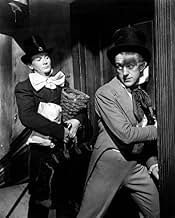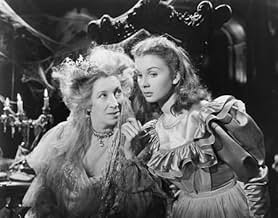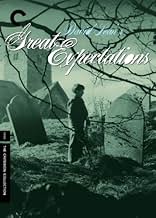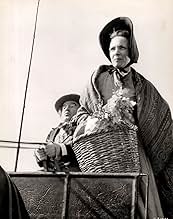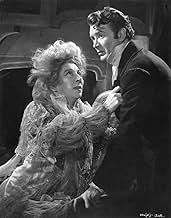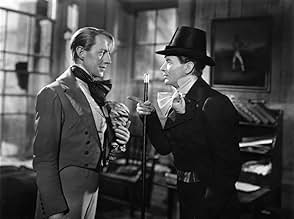IMDb-BEWERTUNG
7,8/10
27.724
IHRE BEWERTUNG
Ein bescheidenes Waisenkind wird mit Hilfe eines unbekannten Wohltäters plötzlich ein Gentleman.Ein bescheidenes Waisenkind wird mit Hilfe eines unbekannten Wohltäters plötzlich ein Gentleman.Ein bescheidenes Waisenkind wird mit Hilfe eines unbekannten Wohltäters plötzlich ein Gentleman.
- 2 Oscars gewonnen
- 11 Gewinne & 4 Nominierungen insgesamt
Tony Wager
- Young Pip
- (as Anthony Wager)
O.B. Clarence
- The Aged Parent
- (as O. B. Clarence)
Empfohlene Bewertungen
As a fan of many so-called classic films, I am nonetheless aware that there is some validity to the criticism that early movies (say, anything before Brando in Streetcar) as a rule have less vitality than their modern counterparts, are formulaic to a fault, and strain the limits of modern attention spans more than can be fully blamed on the viewer. Great Expectations treads miles clear of any of these criticisms, and so I recommend it in particular to anyone who has a general disdain for films that a) were released in the first half of the 20th century and/or b) were shot in black and white. Here is one that can change your mind.
Naturally, given the talents of the author, the plot itself leaves little to be desired. Further, David Lean, his cast, and his crew, have done a splendid job translating Dickens to the screen. This is indeed, as the Criterion Collection folks have classified it, one of the "Great Adaptations." I doubt that there is a better cinematic adaptation of any Dickens novel and am almost certain there is none in which the Dickensian English dialogue flows more pleasantly and naturally. The actors herein deliver Dickens as Olivier himself delivered Shakespeare. Nor is this an unimportant accomplishment; having to spend a couple of hours listening to actors who sound more like they are delivering a series of quotes (though admittedly they are) than that they are actually conversing can be positively unbearable. Indeed I think that's the main thing that people are hitting upon when, with broad brush-strokes, they paint older films as tedious. Great Expectations is the antidote to just this attitude.
If you are a lover of classic films, you have likely already seen this one or will do so regardless of my review, but if, on the other hand, you entertain the possibility of watching Great Expectations with a deep-seated skepticism I implore you to give it a chance. I have every confidence you'll be pleasantly surprised and find yourself drawn into what is, after all, a fascinating story.
Naturally, given the talents of the author, the plot itself leaves little to be desired. Further, David Lean, his cast, and his crew, have done a splendid job translating Dickens to the screen. This is indeed, as the Criterion Collection folks have classified it, one of the "Great Adaptations." I doubt that there is a better cinematic adaptation of any Dickens novel and am almost certain there is none in which the Dickensian English dialogue flows more pleasantly and naturally. The actors herein deliver Dickens as Olivier himself delivered Shakespeare. Nor is this an unimportant accomplishment; having to spend a couple of hours listening to actors who sound more like they are delivering a series of quotes (though admittedly they are) than that they are actually conversing can be positively unbearable. Indeed I think that's the main thing that people are hitting upon when, with broad brush-strokes, they paint older films as tedious. Great Expectations is the antidote to just this attitude.
If you are a lover of classic films, you have likely already seen this one or will do so regardless of my review, but if, on the other hand, you entertain the possibility of watching Great Expectations with a deep-seated skepticism I implore you to give it a chance. I have every confidence you'll be pleasantly surprised and find yourself drawn into what is, after all, a fascinating story.
As I watched the beginning of this film, I couldn't help but compare the story to the only other Charles Dickens story I was familiar with: Oliver Twist. It looked like it was going to be another story of a nice, respectful boy being abused by nasty adults. However, as soon as the young boy turned into a man, the similarities ended. Poor Oliver had a lot of ups and downs but life was basically pretty good for the boy, "Pip" in "Great Expectations."
Because of that, I didn't think this Dickens tale had the emotional impact of Oliver Twist, but still was great storytelling. The last 20-30 minutes of this film tied so many things together it really made it a satisfying film. From what I just researched, it sounds like the book was a lot harsher story.
My only major complaint with this film is the casting of the lead character, "Pip," as an adult, which involves most of this movie. John Mills looked way too old to be playing a 20-year-old "Pip Pirrip." In truth, he was too old. Mills was 38 when doing this role. They couldn't have found a younger actor? This guy looked and sounded like Ronald Colman, which is fine except Colman never looked 20, either! This is gross miscasting.
At any rate, I enjoyed a number of actors in here, mainly three older ones: Martita Hunt, Findlay Currie and Francis L. Sullivan. Hunt was just great as "Miss Haversham." I found her fascinating in every sentence she delivered, all of which she did while just sitting in a chair. Currie was genuinely frightening in the beginning as the escaped convict "Magwitch." However, what a transformation that man made in this story! Francis L. Sullivan emotes convincingly enough to play the
lawyer "Mr. Jaggers" and be fun to view, too. The rest of the actors were fine, but nothing memorable.
To me, the acting took a back seat to Dickens' story and to the film's cinematography. Knowing David Lean directed this film, that Criterion usually produces nice-looking DVD transfers and that "Oliver Twist" looked fantastic on disc, I was paying as close attention to the cinematography, and I enjoyed it. The story wasn't that intense until the finale, which was very well done. The romance was a bit questionable and is a sad-but-true comment how many people, at least us men, can be "in love" with a shallow woman who offers nothing but good looks. (Speaking of looks, Valerie Hobson pretending to be a little older Jean Simmons in the role of "Estella' is like Margaret Hamilton passing for slightly-older Jennifer Jones. Give me a break!)
Even though the screenplay is softer than the novel, most people say it still captures Dickens' flavor, and few critics had anything but praise for this classic film. Do I prefer this movie over the aforementioned Oliver Twist? No, but only because the latter is the most stunning photographed black-and-white movie I've ever watched. ("Citizen Kane" ranking second.) This is still very good in that category. Lean and cinematographer Guy Green won Oscars for their work here, so you know it's not too shabby.
The combination of Dickens, Lean, Green and a fine cast all make this a classic movie that is certainly recommended. Don't make the mistake of choosing the insipid 1998 version with Ethan Hawke and Gywneth Paltrow. This is the only version you want to see.
Because of that, I didn't think this Dickens tale had the emotional impact of Oliver Twist, but still was great storytelling. The last 20-30 minutes of this film tied so many things together it really made it a satisfying film. From what I just researched, it sounds like the book was a lot harsher story.
My only major complaint with this film is the casting of the lead character, "Pip," as an adult, which involves most of this movie. John Mills looked way too old to be playing a 20-year-old "Pip Pirrip." In truth, he was too old. Mills was 38 when doing this role. They couldn't have found a younger actor? This guy looked and sounded like Ronald Colman, which is fine except Colman never looked 20, either! This is gross miscasting.
At any rate, I enjoyed a number of actors in here, mainly three older ones: Martita Hunt, Findlay Currie and Francis L. Sullivan. Hunt was just great as "Miss Haversham." I found her fascinating in every sentence she delivered, all of which she did while just sitting in a chair. Currie was genuinely frightening in the beginning as the escaped convict "Magwitch." However, what a transformation that man made in this story! Francis L. Sullivan emotes convincingly enough to play the
lawyer "Mr. Jaggers" and be fun to view, too. The rest of the actors were fine, but nothing memorable.
To me, the acting took a back seat to Dickens' story and to the film's cinematography. Knowing David Lean directed this film, that Criterion usually produces nice-looking DVD transfers and that "Oliver Twist" looked fantastic on disc, I was paying as close attention to the cinematography, and I enjoyed it. The story wasn't that intense until the finale, which was very well done. The romance was a bit questionable and is a sad-but-true comment how many people, at least us men, can be "in love" with a shallow woman who offers nothing but good looks. (Speaking of looks, Valerie Hobson pretending to be a little older Jean Simmons in the role of "Estella' is like Margaret Hamilton passing for slightly-older Jennifer Jones. Give me a break!)
Even though the screenplay is softer than the novel, most people say it still captures Dickens' flavor, and few critics had anything but praise for this classic film. Do I prefer this movie over the aforementioned Oliver Twist? No, but only because the latter is the most stunning photographed black-and-white movie I've ever watched. ("Citizen Kane" ranking second.) This is still very good in that category. Lean and cinematographer Guy Green won Oscars for their work here, so you know it's not too shabby.
The combination of Dickens, Lean, Green and a fine cast all make this a classic movie that is certainly recommended. Don't make the mistake of choosing the insipid 1998 version with Ethan Hawke and Gywneth Paltrow. This is the only version you want to see.
Few directors have ever matched David Lean's ability to bring great literary works to life on film, and this is one of his best productions. The Dickens novel itself is so good that even routine film adaptations of it are usually quite watchable, but this version is exceptional, with atmosphere, settings, photography, and characters that do full justice to the original. From the very beginning, with a wonderful realization of the graveyard scene, you are drawn into the world of Pip and the other characters, and feel that you can understand their concerns and dilemmas.
One of the things that makes "Great Expectations" such a classic story is that it adds some real depth to Dickens's usual slightly exaggerated characters, so that they are both memorable and thought-provoking. Characters such as Miss Havisham and Magwitch are interesting in their own right, besides serving as vital influences on Pip's life. Here the fine cast and directing help to realize the potential of the characters, making for an interesting story that also has some things to say. John Mills brings out Pip's innocence and earnestness very believably, and the supporting cast works quite well too. Some of them seem to be almost exactly what Dickens would have envisioned, such as Jean Simmons as the young Estella and Francis Sullivan as Jaggers (a role he also played in an earlier version).
This is exactly what a film version of a classic book should be, keeping the most important themes and events from the story and using the visuals to bring its world to life. It's an excellent movie that is enjoyable and nicely done in every respect.
One of the things that makes "Great Expectations" such a classic story is that it adds some real depth to Dickens's usual slightly exaggerated characters, so that they are both memorable and thought-provoking. Characters such as Miss Havisham and Magwitch are interesting in their own right, besides serving as vital influences on Pip's life. Here the fine cast and directing help to realize the potential of the characters, making for an interesting story that also has some things to say. John Mills brings out Pip's innocence and earnestness very believably, and the supporting cast works quite well too. Some of them seem to be almost exactly what Dickens would have envisioned, such as Jean Simmons as the young Estella and Francis Sullivan as Jaggers (a role he also played in an earlier version).
This is exactly what a film version of a classic book should be, keeping the most important themes and events from the story and using the visuals to bring its world to life. It's an excellent movie that is enjoyable and nicely done in every respect.
Charles Dickens certainly liked to write his novels from a child's point of view. Oliver Twist, David Copperfield, and Great Expectations all start with the hero/protagonist as a child. Only young Oliver Twist of the three I mentioned ended still a child in the novel's conclusion. In Oliver Twist, young Oliver is reunited with his propertied and somewhat wealthy grandfather looking to rise in station from his humble background.
Young Pip, short for Philip Pirrup, is also of humble background in Great Expectations. His parents are killed when he's young, he lives with his sister and her husband who is a blacksmith. During his childhood he befriends a convict on the run. Later on for mysterious reasons to him, he comes under the protection of eccentric old Miss Haversham who wants him as a companion for her adopted child Estella.
Later on as an adult, he has a mysterious benefactor who provides him income enough to live as a gentlemen, something he fervently desired all his life. It seems to be a dream come true. But there are still quite a few bumps on Pip's road of life.
Charles Dickens despaired of the poverty he saw in early Victorian Great Britain. But he also knew that riches alone did not necessarily guarantee happiness. It didn't for Scrooge, for Ms. Havisham, and certainly not for John Mills as the adult Pip. Nor does it for Valerie Hobson who inherits Ms. Havisham's estate.
Mills and Hobson are a perfectly cast pair of leads in this version of Great Expectations. Alec Guinness began a long association with director David Lean as Herbert Pocket, Pip's friend and roommate.
Finlay Currie, the craggy Scot's player who usually played kindly old gentlemen, turns out to be kinder indeed than originally presented as convict Abel Magwitch. It's a different kind of part for him.
Martita Hunt as Ms. Havisham plays a part all to familiar to me. I had an elderly relative in my family a lot like her, bitter at the world and taking it out on all around her.
My favorite in the film though is Francis L. Sullivan. Usually Sullivan's characters are crooked and/or corrupt in most of his films. As attorney Jaggers who seems to have an unseen hand in all the proceedings he actually is working for the ultimate benefit of both of our leads.
In Dickens's world, wealth can corrupt as easily as poverty. It's the character inside you that counts and that fact is not better demonstrated than in this adaption of Great Expectations.
Young Pip, short for Philip Pirrup, is also of humble background in Great Expectations. His parents are killed when he's young, he lives with his sister and her husband who is a blacksmith. During his childhood he befriends a convict on the run. Later on for mysterious reasons to him, he comes under the protection of eccentric old Miss Haversham who wants him as a companion for her adopted child Estella.
Later on as an adult, he has a mysterious benefactor who provides him income enough to live as a gentlemen, something he fervently desired all his life. It seems to be a dream come true. But there are still quite a few bumps on Pip's road of life.
Charles Dickens despaired of the poverty he saw in early Victorian Great Britain. But he also knew that riches alone did not necessarily guarantee happiness. It didn't for Scrooge, for Ms. Havisham, and certainly not for John Mills as the adult Pip. Nor does it for Valerie Hobson who inherits Ms. Havisham's estate.
Mills and Hobson are a perfectly cast pair of leads in this version of Great Expectations. Alec Guinness began a long association with director David Lean as Herbert Pocket, Pip's friend and roommate.
Finlay Currie, the craggy Scot's player who usually played kindly old gentlemen, turns out to be kinder indeed than originally presented as convict Abel Magwitch. It's a different kind of part for him.
Martita Hunt as Ms. Havisham plays a part all to familiar to me. I had an elderly relative in my family a lot like her, bitter at the world and taking it out on all around her.
My favorite in the film though is Francis L. Sullivan. Usually Sullivan's characters are crooked and/or corrupt in most of his films. As attorney Jaggers who seems to have an unseen hand in all the proceedings he actually is working for the ultimate benefit of both of our leads.
In Dickens's world, wealth can corrupt as easily as poverty. It's the character inside you that counts and that fact is not better demonstrated than in this adaption of Great Expectations.
When David Lean directed Great Expectations, he used black and white, even though color was available. From the very first scene, you see that the black and white brings out a quality in the film, that wouldn't have been achieved with color. The black and white makes the film seem simpler than it really is. Great Expectations is a film, which ends very nicely for the characters, but their journeys throughout the film are not.
Pip sees himself for the rude snob he became, and Estella prides herself for being a heartless, ruthless bitch (for lack of a better word), and Miss Havisham is cold, and simply out to destroy men. The only person in this film who is not arrogant, or evil is the simple Joe.
I am far from a film expert. Infact, I only watched this movie because I am studying Great Expectations at school. However, after hours of in-depth discussion, there is so much more to this film than meets the eye. My favorite scenes are those in the first quarter of an hour. Lean's use of Silhouettes gives the search for the two escaped convicts a feel of war, and creates an atmosphere of tension very well. It also introduces the key characters in the story excellently.
As far as the story goes, I found it much easier on the head to watch than the book was to read. While it wasn't close in length to books i've read before (I think it's shorter than my little brother's "Harry Potter" books), it took me close to 30 hours to read. The movie compacts the majority of the book into 2 hours of film. The exclusion of characters like Orlick I have no problem with, as they are nearly completely irrelevant to the story. Lean explains the death of Pip's sister in less than 10 seconds, while the book takes somewhere in the region of 10 pages.
The acting is excellent. Alec Guinness was the only actor I had heard of, and that was only thanks to George Lucas. John Mills was interesting to watch, and after seeing the movie, I didn't know weather to like Pip for how he ended up, or to see him for the nasty person he had changed into (and come back from).
Only when watching it for the second time, did i realise the thought behind the direction. When Magwitch reappears, the atmosphere from their first meeting is created exactly; even the wind sounds the same. The sets were also incredible, and remade 19th century England perfectly. Ms. Havisham's `Statis House' was particularly memorable for me, as it is exactly how I pictured it from reading.
David Lean's Great Expectations set a benchmark in 1946 for great movies. It was nominated and won several Oscars, and is still enjoyed today. Every aspect of this film was enjoyable, it tells a great story, and if you look closer, you will appreciate the art of film making a little more, as I have.
Pip sees himself for the rude snob he became, and Estella prides herself for being a heartless, ruthless bitch (for lack of a better word), and Miss Havisham is cold, and simply out to destroy men. The only person in this film who is not arrogant, or evil is the simple Joe.
I am far from a film expert. Infact, I only watched this movie because I am studying Great Expectations at school. However, after hours of in-depth discussion, there is so much more to this film than meets the eye. My favorite scenes are those in the first quarter of an hour. Lean's use of Silhouettes gives the search for the two escaped convicts a feel of war, and creates an atmosphere of tension very well. It also introduces the key characters in the story excellently.
As far as the story goes, I found it much easier on the head to watch than the book was to read. While it wasn't close in length to books i've read before (I think it's shorter than my little brother's "Harry Potter" books), it took me close to 30 hours to read. The movie compacts the majority of the book into 2 hours of film. The exclusion of characters like Orlick I have no problem with, as they are nearly completely irrelevant to the story. Lean explains the death of Pip's sister in less than 10 seconds, while the book takes somewhere in the region of 10 pages.
The acting is excellent. Alec Guinness was the only actor I had heard of, and that was only thanks to George Lucas. John Mills was interesting to watch, and after seeing the movie, I didn't know weather to like Pip for how he ended up, or to see him for the nasty person he had changed into (and come back from).
Only when watching it for the second time, did i realise the thought behind the direction. When Magwitch reappears, the atmosphere from their first meeting is created exactly; even the wind sounds the same. The sets were also incredible, and remade 19th century England perfectly. Ms. Havisham's `Statis House' was particularly memorable for me, as it is exactly how I pictured it from reading.
David Lean's Great Expectations set a benchmark in 1946 for great movies. It was nominated and won several Oscars, and is still enjoyed today. Every aspect of this film was enjoyable, it tells a great story, and if you look closer, you will appreciate the art of film making a little more, as I have.
Wusstest du schon
- WissenswertesSir Alec Guinness admired the way Sir David Lean directed him, singling out a close-up in which he had to laugh out loud, and which he struggled to make look unmanufactured. Lean told him to forget about the whole thing, sat by his side, and made a little signal to the camera to start turning in the course of the conversation. He said something which made Guinness laugh and then said, "Cut." Guinness: "So he got this shot on a totally false premise, but thank God. I don't think I would have ever achieved it otherwise."
- PatzerAt the end, when Pip is persuading Estella to leave Satis House with him, a 'Chad' is clearly visible drawn on the screen behind him (Chads were a popular form of graffiti in the 1940s - a character with a big nose looking over a wall). Chad is a British term; the American equivalent would be Kilroy, as in 'Kilroy was here'.
- Crazy CreditsThe identity of the actress playing Molly is never revealed, because this would constitute a spoiler.
- Alternative VersionenIn some prints, after the fifteen minute "convict episode" at the beginning of the film ends, a voice-over by the adult Pip (John Mills) says, "it was a year later", as Mrs. Joe arrives home in the carriage. As now usually shown, there is no voice-over in this sequence.
- VerbindungenFeatured in Moscow in Madrid (1965)
Top-Auswahl
Melde dich zum Bewerten an und greife auf die Watchlist für personalisierte Empfehlungen zu.
Details
- Erscheinungsdatum
- Herkunftsland
- Offizieller Standort
- Sprache
- Auch bekannt als
- Geheimnisvolle Erbschaft
- Drehorte
- St Mary's Marshes, Kent, England, Vereinigtes Königreich(opening sequence - Pip and Herbert Pocket ride in rowboat)
- Produktionsfirma
- Weitere beteiligte Unternehmen bei IMDbPro anzeigen
Box Office
- Budget
- 350.000 £ (geschätzt)
- Weltweiter Bruttoertrag
- 33.408 $
- Laufzeit
- 1 Std. 58 Min.(118 min)
- Farbe
- Seitenverhältnis
- 1.37 : 1
Zu dieser Seite beitragen
Bearbeitung vorschlagen oder fehlenden Inhalt hinzufügen


